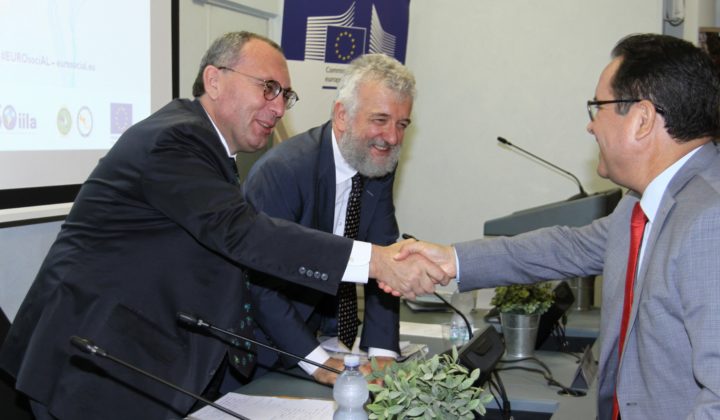Stefano Manservisi, general director of EuropeAid, pointed out that EUROsociAL+ “is not just a project but a way of creating structural linkages"

The offices of the representations of the European Commission in the three countries coordinating EUROsociAL+ on the old continent hosted the kick-off events for the new phase of the Programme while simultaneously presenting the joint challenges of the European Union and Latin America in each of the policy areas to be tackled during this stage: gender, democratic governance and social policies. Thus, in succession, Madrid, Paris and Rome fostered a dialogue on the challenges the Programme will address. The final event included the participation of the Director-General of EuropeAid, Stefano Manservisi, who pointed out that EUROsociAL+ “is not just a project but a way of creating structural linkages between what I believe to be the integrating realities of the world, with their different logics, because, if the motto of Europe is ‘United in diversity’, it is clear that Europeans and Latin Americans are united by many diversities”.
Another event laden with symbolism that took place in the Italian capital was to take the presentation of the Programme to the “Orazi e Curiazi” hall of the “Palazzo dei Conservatori” in the “Campidoglio”, the same scenario where, in 1957, the Treaties of Rome were signed that gave rise to the project of European integration and which this year are commemorating their 60th anniversary. In this emblematic setting, Marina Sereni, vice president of the Italian chamber of deputies, stressed “the importance of social inclusion policies, the fight against poverty, active employment policies for young people and adolescents, and aid to underprivileged groups for Europe and Latin America”. For his part, the Colombian ambassador to Italy and president of the IILA, Juan Mesa Zuleta, stated that EUROsociAL+ is a key instrument for bi-regional dialogue on public policies: “social cohesion must continue to be a fundamental value in the partnership between Europe and Latin America, and not only is it necessary to strengthen the instruments of our knowledge but also to promote an openness to new stakeholders who can contribute to making the legitimate aspirations of our peoples a reality”.
Earlier, in Paris, the director of the European Commission representation in France, Isabelle Jégouzo, stated that “gender equality is a relevant criterion for the proper functioning of societies”, explaining by way of example that “every year, from 2 November, women work without pay” as proof of the inequality that continues to exist between women and men. In the French capital, the director general of Expertise France, Sébastien Mosneron-Dupin, described EUROsociAL as “an emblematic programme in which the gender dimension is essential. A society with greater equality between men and women is a more just and dynamic society”.
Meanwhile, in the first episode of this trilogy, at the office of the European Commission representation in Spain, the director of EUROsociAL+, Juan Manuel Santomé, announced “the shared challenge of this third phase which aims to achieve truly strategic results by supporting key policies”. Some of these key policies are ones that promote better democratic governance, “not only to protect public funds but also as a value in and of itself, as a sense of citizenship”, added Marisa Ramos, the coordinator of the democratic governance area.
EUROsociAL+ has started at full capacity in both regions, taking up the baton of the work done in the two earlier phases. In 14 Latin American countries, simultaneous missions were carried out with actions to share the Programme in Europe in spaces like the European Parliament in Brussels and the offices of the European Commission in Brussels, Madrid, Paris and Rome, an exercise that will cross the Atlantic when the annual Programme meeting is held on Central American soil.
EUROsociAL+.



